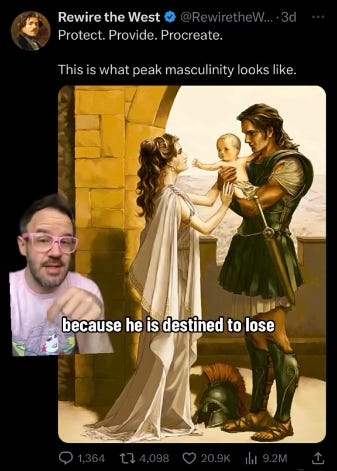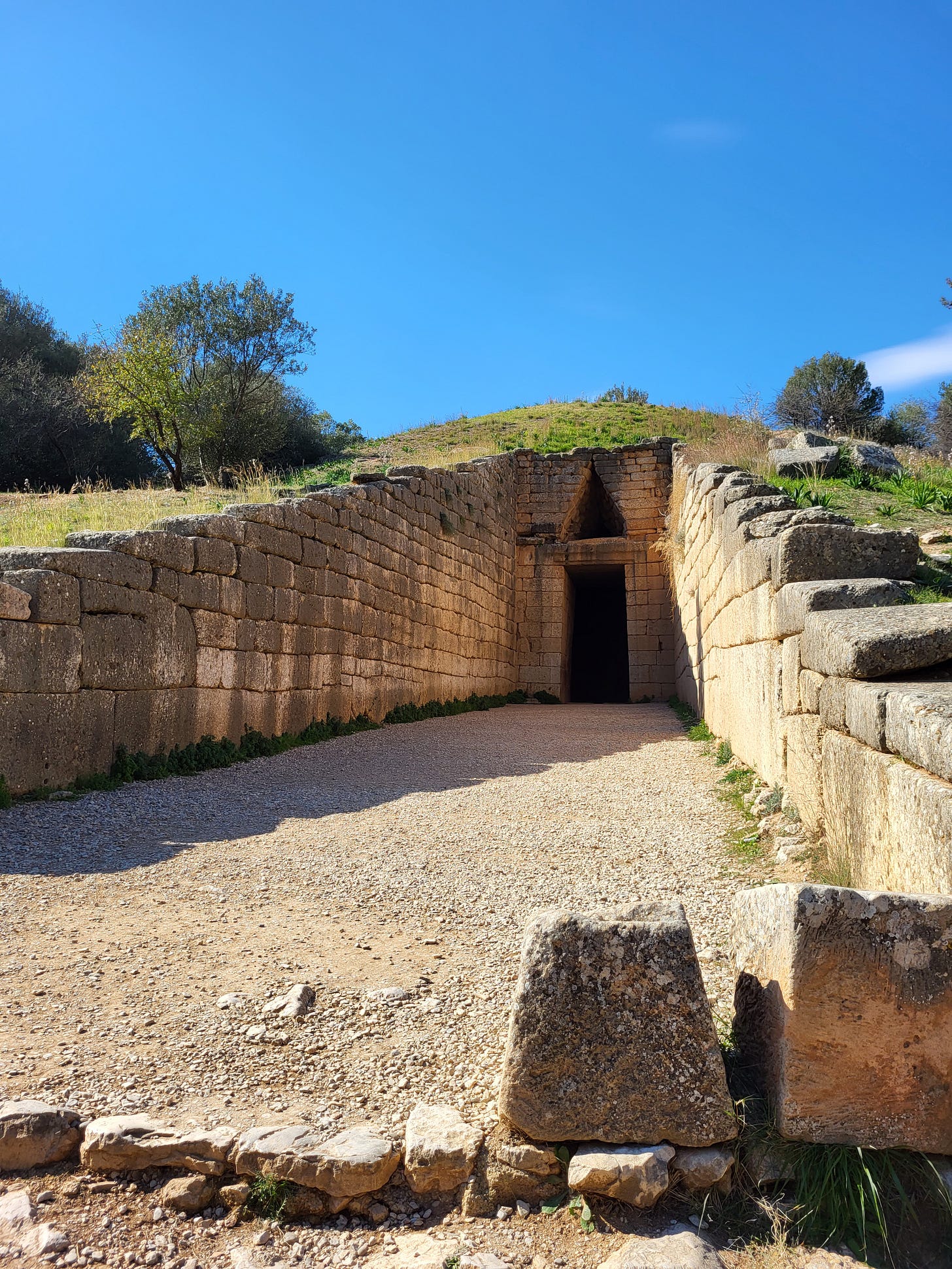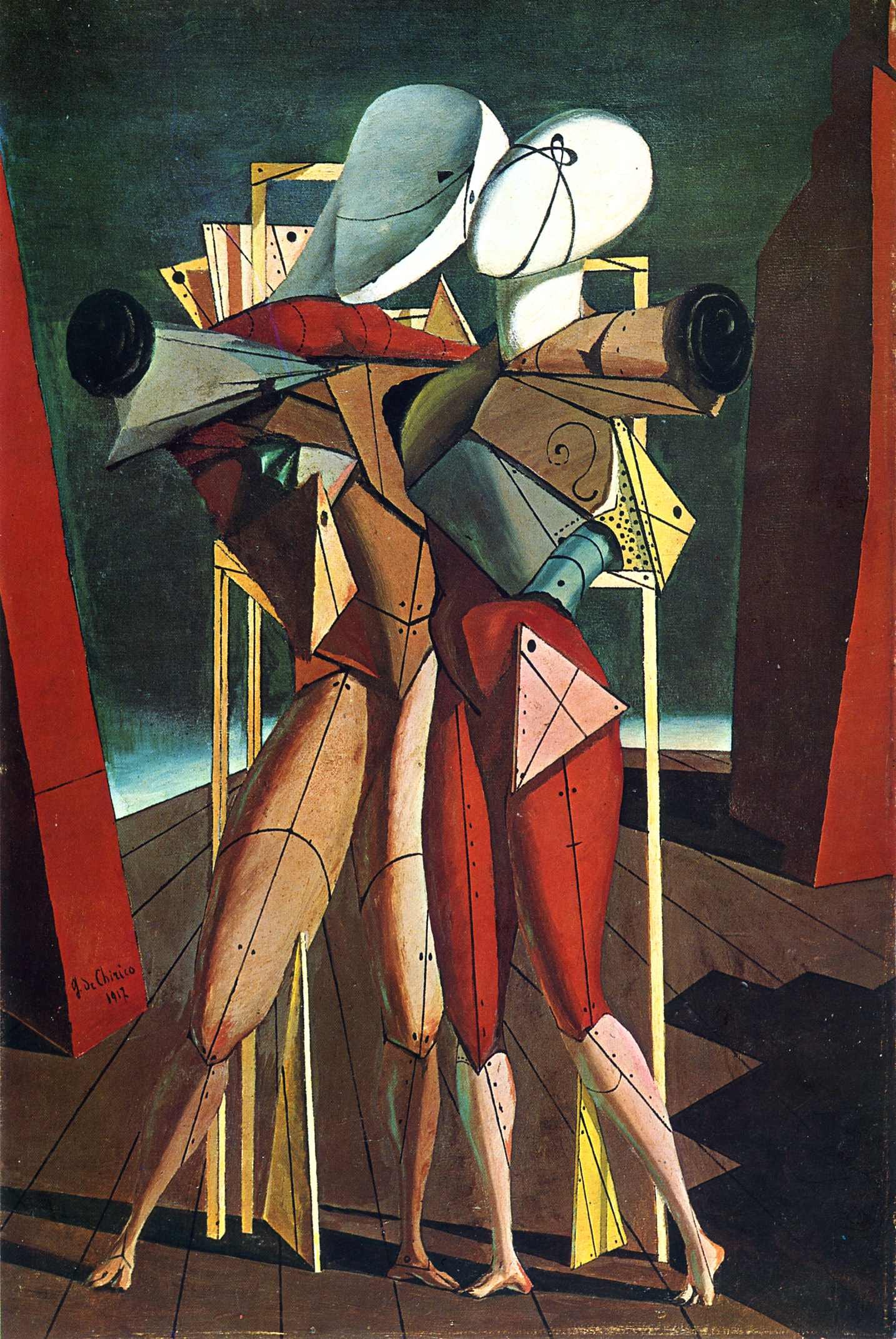peak masculinity
on using epic heroes as role models
Protect. Provide. Procreate.
No you haven’t clicked onto the wrong blog. Those words and the accompanying message broke me out of my doomscrolling stupor. It was being reacted to by ‘professor_neil’ on Instagram, and while I usually agree with his takes, this one pulled me up short.

Here is the transcript from Prof Neil’s video:
So this is a painting of Hector and his wife, Andromache — you might know them from the Iliad — depicting the moment where she begs him not to go outside the walls of the city and fight Achilles because he is destined to lose. he ignores her, of course, goes off to fight, loses, and dies. His army is subsequently defeated, his wife is enslaved, and his son is thrown to his death from the walls of the city. So, protect? No. Provide? No. Procreate? Uh, technically, I guess. I don’t think this tweet was meant to be a joke or ironic, but if this is what ‘peak masculinity’ looks like…
For further context, Hector is the prince of Troy, and the strongest warrior on his side of the Trojan war. He had earned the favour of the god Apollo through his piety and strength. The Greeks (called Achaeans in the Iliad, but I’ll call them Greeks for simplicity) were terrified of him, and he was a key reason why Troy was unconquered for 10 years.
In Book 6 of the Iliad, he is forced to re-enter the city to bring his brother Paris back to the battlefield, and uses the chance to speak to his wife and son for what would be the last time. His wife, Andromache, begs him to stay in the city with her, as he and their son Astyanax are her only living family. Her parents and seven brothers were all killed by Achilles earlier in the war. Both her and Hector know that if the city were captured, the Greeks would enslave her and she would be entirely at their mercy.
I don’t normally comment on posts but I was compelled. Here is the ensuing comment chain.
me:
I don't know if someone who calls themselves "rewire the west" would value hector if they knew he was from what is now Turkey. tbf neither him nor the Greeks he was fighting would be as pale as the figures in that painting, bc that's not how their contemporaries depicted themselves. hector is a lot more of a nuanced character than perhaps you give him credit for. I find it tragic that he feels so bound to his code of honour that even though he knows his wife is right, he is compelled to fight so to not abandon his fellow soldiers. at his funeral, the speeches given by helen, hecuba, amdromache and briseis reveal how uniquely compassionate he was
person who replied:
it really just shows, as men of today, he is only doing things to prioritize how he looks in front of other men!! Which is not heroic, but pathetic! When it mattered he couldn’t do what he should have done and save his wife and child!!! It is simply just ego!! The current problem with almost all men!👍👍
me:
that's one interpretation sure, but it's not the only way to view hector. I don't think he's pathetic, I think he's tragic. he wants whats best for both his family and his people, and he believes that supporting his fellow soldiers on the battlefield. is this misguided? sure, but we see what happens if you leave your soldiers behind through achilles leaving the fight, and it's detrimental to his people. if hector stayed behind, he would be justified in thinking that it would risk not just his immediate family but his people. he's a human stuck in a warzone for 10 years, and his decisions reflect that. I agree that men have an ego problem, but honestly there's other characters in the iliad who better illustrate that than hector
person who replied again:
yes, that’s true about other characters would better illustrate that 👍 it is indeed just my perspective ☺️ thanks for sharing yours 🙏
I would like to clarify my mistake. Briseis gave a speech as Patroclus’ funeral, not Hector’s one.
The disagreement between Hector and Andromache reveals many things, which both 'Rewire the West’ and Professor Neil misunderstand. Hector and Andromache are both coming from a place of love. They both want their family to survive the war, which is an impossible situation to navigate. We know how Hector’s decision plays out. Staying on the battlefield and killing Patroclus seals his own death. What would have happened if he followed Andromache’s advice to direct his army from behind the city walls to defend a particularly vulnerable area? They would have stayed there slightly longer until the war reaches them inside the palace. With his father and siblings murdered and his home in flames, would he really have been able to successfully defend his wife and child? And then do what? Either die trying to defend his home, or escape and lose someone in the process like Aeneas.
That’s not to say that Andromache’s advice is bad; she is very intelligent and their conversation shows us how well-matched the couple is. But to think that Hector really had a chance to save himself, his family and his home, is to misunderstand the poem. The poet, whom we call Homer, shows us the illusion of choice to deepen the impact of the tragedy, a common theme throught the Iliad. Hector will lose everything both through his decisions, but also through Fate. Apollo is with him till the very last second, abandoning him during his fatal duel with Achilles. It is a fate that Hector oscillates between knowing and denying. He says in this very conversation, that he knows Troy will fall and Andromache will be enslaved, and that he will die before this happens. But a modern audience is less satisfied by the presence of the divine in these stories, and so we blame Hector for not listening to Andromache, like we blame Orpheus for turning around. Instead, acknowledging the double-tragedy of choice and fate takes us to the emotional core of this story, which is the awful reality that a family in a warzone goes through, something that will always be relevant.
This whole thing started because ‘Rewire the West’ wanted us to look at Hector as a paragon of masculinity. “Protect. Provide. Procreate.” he bleats to a crowd of men who have likely never protected nor provided for anyone in any meaningful way. He chooses an image that depicts Hector and Andromache as pale, because to acknowledge that people in the ancient Mediterranean didn’t look like Matt Damon would undermine his point. I partially agree with Prof Neil that Hector ultimately fails to meet these three criteria. Certainly his father, Priam, would be a better role model for procreation given that he had up to 100 children (depending on which poem you’re reading).
But to imagine that ‘Rewire the West’ cares in any way about creating a conversation about the Iliad would be far too generous. He wants to sell an image of an ideal (whitewashed) man to men who keep a gun under their pillow at night just in case, but leave doing their laundry to their wife (or mum) because it’s “too complicated”.
For over one thousand years people, for better or for worse, have used the heroes of the Iliad as role models. I don’t admire Hector for his brutal strength, nor his desire to prove his glory. However, I appreciate that he finds a moment to laugh with Andromache in the face of war; he takes his helmet off when it frightens his infant son, he is one of very few people who shows genuine kindness to Helen.
Now that is peak masculinity.





This is a fantastic piece -- I love the way you bring together contemporary and ancient issues and narratives. Fascinating.
Love this take as a Hector fan, also, that photo brings back memories :)